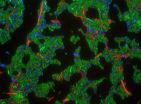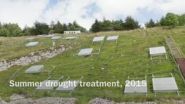Health providers trained to perform malaria rapid diagnostic tests (RDT) are still prescribing valuable malaria medicines to patients who do not have malaria, according to new research published in PLOS ONE.
Almost 5,000 participants from 40 communities took part in the study, at a variety of public health facilities, pharmacies and drug stores in the Nigerian state of Enugu. Despite the three different training interventions that they received and their satisfaction with the courses and materials, rates of RDT use remained less than 50%.
The researchers from the Artemisinin-based Combination Therapy (ACT) Consortium at the University of Nigeria and the London School of Hygiene & Tropical Medicine in the UK split the health workers into three groups, to either receive a comprehensive RDT training or the same training plus a health campaign in schools, while the control arm received basic instructions to use RDTs. The first group had the highest rate of testing (48%), especially in public health facilities.
Prof. Obinna Onwujekwe from the University of Nigeria, lead author of the study, said: "This study confirms that treating malaria based on signs and symptoms alone remains an ingrained behaviour that is difficult to change. If governments want RDTs to effectively target the use of ACTs and avoid their misuse, then they must be supported by varieties of intensive and sustained interventions aimed at changing the behaviour of health providers and the expectations of patients and their families."
Dr. Virginia Wiseman, health economist at the London School of Hygiene & Tropical Medicine and also a principal investigator in the study, said: "Many studies have investigated the performance of RDTs in ideal settings. With this research we aimed to see how our interventions influenced behaviours, according to the different health services and contexts. We have shown that training alone is not enough to realise the full potential of an RDT. We must continue to explore alternative ways of encouraging providers to deliver appropriate treatment and avoid the misuse of valuable medicines especially in the private sector where we found levels of testing to be lowest".
At present, many health workers in malaria endemic countries usually treat patients based on their signs and symptoms without testing their blood for the presence of malaria parasites, as recommended by the World Health Organization. This can result in patients with a fever being overdiagnosed with malaria and receiving an ACT which they don't need.
Microscopy is a method that requires laboratory equipment and qualified staff, while RDTs are alternative, simple tools that require minimal training to diagnose malaria. These rapid tests can help health workers and vendors in remote locations to prescribe the correct treatment for malaria.
INFORMATION:
The ACT Consortium is funded by a grant from the Bill & Melinda Gates Foundation to London School of Hygiene & Tropical Medicine.
For more information or to request interviews contact the press office at the London School of Hygiene & Tropical Medicine: press@lshtm.ac.uk and +44 (0)20 7927 2802.
Notes to Editors:
Onwujekwe O, Mangham-Jefferies L, Cundill B, Alexander N, Langham J, Ibe O, et al. (2015) Effectiveness of Provider and Community Interventions to Improve Treatment of Uncomplicated Malaria in Nigeria: A Cluster Randomized Controlled Trial. PLoS ONE 10(8): e0133832. doi:10.1371/journal.pone.0133832
The paper is available at: http://journals.plos.org/plosone/article?id=10.1371/journal.pone.0133832
Learn more about this research, download resources and watch a video with the investigators at http://www.actconsortium.org/REACTNigeria
Learn more a parallel study conducted in Cameroon published in The Lancet Global Health: http://www.actconsortium.org/REACTCameroon
Watch and use a 90 second animation about the wider problem of malaria diagnosis at https://vimeo.com/109480993 (English), https://vimeo.com/125150730 (French) and https://vimeo.com/125548287 (Portuguese)
Providers in the control arm were shown how to safely use RDTs and supplied with written instructions. The provider intervention was designed to be suitable for implementation on a large scale, and involved seminars, group work, games and role-playing. It covered not only how to use an RDT, but also guidelines on malaria diagnosis and treatment, other causes of fever and communications skills, especially for patients whose test result is negative. The third arm was comprised of the provider intervention as well as a school-based intervention which involved training two teachers per school. The aim was to influence the attitudes of school children and their families as well as the wider community.
Collaborating institutions: London School of Hygiene & Tropical Medicine, UK; University of Nigeria, Nigeria; University of New South Wales, Australia
About the ACT Consortium
The ACT Consortium is an international research collaboration working on 25 projects in 10 countries to answer key questions on malaria drug delivery. Since initiating activities in 2008, the Consortium has been working to optimise the use of Artemisinin-based Combination Therapy (ACT), the first-line treatment for the most dangerous form of malaria recommended by the World Health Organization. The projects investigate ways to improve the access and targeting of ACTs, as well as assessing their safety and quality. The ACT Consortium is based at the London School of Hygiene & Tropical Medicine and a member of the School's Malaria Centre.
About the London School of Hygiene & Tropical Medicine
The London School of Hygiene & Tropical Medicine is a world-leading centre for research and postgraduate education in public and global health, with 3,900 students and more than 1,000 staff working in over 100 countries. The School is one of the highest-rated research institutions in the UK, and was recently cited as the world's leading research-focused graduate school. Our mission is to improve health and health equity in the UK and worldwide; working in partnership to achieve excellence in public and global health research, education and translation of knowledge into policy and practice. http://www.lshtm.ac.uk



